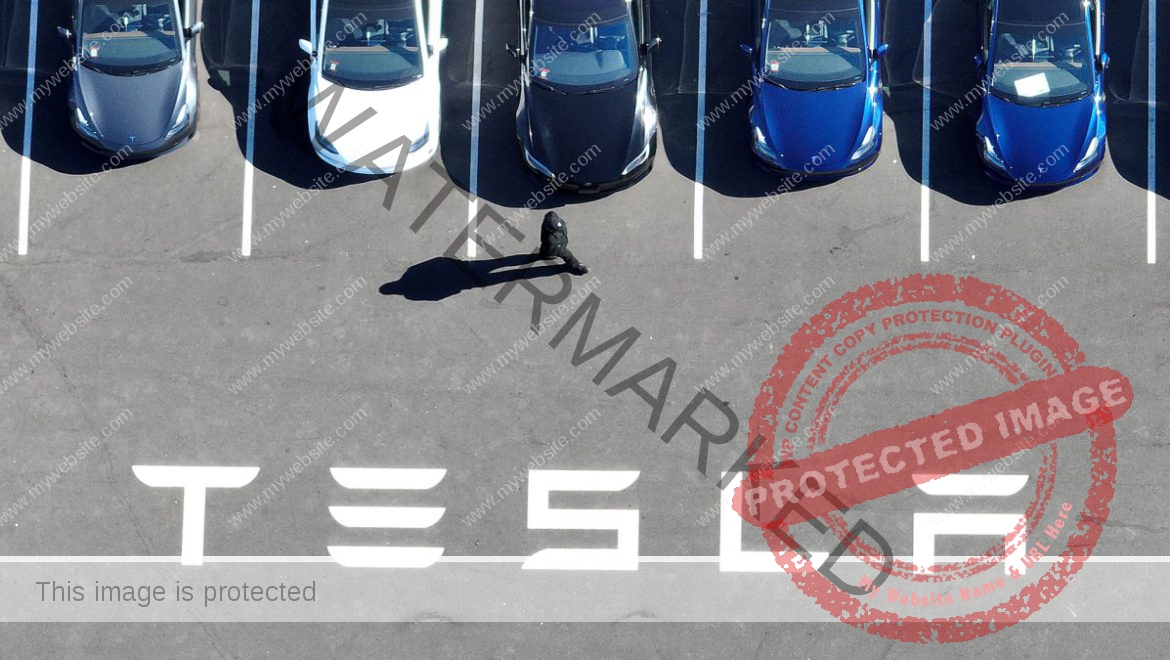Tesla profits tumble, Fisker flatlines, and California cities battle for control of AVs | TechCrunch
Welcome back to TechCrunch Mobility — your central hub for news and insights on the future of transportation. Sign up here — just click TechCrunch Mobility — to receive the newsletter every weekend in your inbox. Subscribe for free.
Welp, Tesla earnings happened this week — and yeah that was a lot. A lot of what, you ask? A lot of the same kinds of promises and hand waving we’ve seen before, but just wrapped up in slightly different packaging. The stakes this time around remind me of Tesla’s pre-profit era circa 2018.
Now, to be clear, Tesla has enjoyed profitability since 2020. But it is facing downward pressure on its bottom line — the company saw profits fall 55% year over year — and an aging portfolio of its highest volume vehicles. (And yes, we covered the new Model 3 Performance variant; I’m talking about new mass market models here.)
Tesla CEO Elon Musk need to generate new sources of revenue. And fast. The company can’t wait two years — or more — to launch a new platform to deliver a sub-$25,000 EV.
So, Musk tweaked that plan, from what we know so far. Which isn’t a lot. During the Q1 earnings call, Musk presented an opaque plan, with few details, to launch multiple cheaper EVs in 2025 (and maybe even late 2024).
Musk understands that the market has rewarded him in the past for being a forward thinker and an innovator — even if those plans don’t come to fruition. So, Musk also pulled on that futurist lever, promising greater levels of automated driving capability in its FSD driver-assistance software and a robotaxi (again). Lest you forget, Musk announced during the company’s Autonomy Day in 2019 that Tesla was going to launch a robotaxi network by the following year. Musk has talked about the Tesla Network and ambitions to allow owners to place their vehicles on the ride-hailing app since 2016.
Shareholders responded with glee because the future is now, or maybe next year. Okay, maybe at the end of the decade? Anyway, it’s exciting.
In an unrelated note, the recently departed high-profile Tesla exec Drew Baglino sold about 1.14 million of his shares worth $181.47 million. The filing described it as an exercise of stock options.
Let’s go!
A little bird
A little bird pointed out to me that Valeo CTO Geoffrey Bouquot is leaving the company after eight years. For the unfamiliar, Valeo is a French car parts supplier that has pushed into the EV and automated driving space. The company even has an AI research center dedicated to automotive applications.
That EV sector had been promising for Valeo, but this recent quarter reflected what is happening in the rest of the sector. The company posted lower first-quarter sales after its high-voltage electrification system sales fell by nearly half. Valeo is now adjusting to automakers’ needs aka hybrids.
Got a tip for us? Email Kirsten Korosec at [email protected], Sean O’Kane at [email protected] or Rebecca Bellan at [email protected]. If you prefer to remain anonymous, click here to contact us, which includes SecureDrop (instructions here) and various encrypted messaging apps.
Deals!
Who’s got deals? We do. Here are a handful that stood out.
Chemix, a company using AI to speed up the development of next-gen EV batteries, raised $20 million in a Series A funding round led by Ibex Investors. Other participants included Mayfield Fund, Berkeley SkyDeck and Urban Innovation Fund as well as strategic investors BNP Paribas Solar Impulse Venture Fund, Global Brain’s KDDI Open Innovation Fund III and Porsche Ventures.
LanzaJet, a sustainable fuels technology company and fuels producer, received an undisclosed investment from Microsoft’s Climate Innovation Fund. A report in Axios Pro says the company is raising $100 million and expects to close this quarter.
Outpost, an Austin, Texas-based startup that manages a network of semi-truck parking facilities, raised $12.5 million in a Series A funding round led by GreenPoint Partners. The newly branded company, founded in 2021 under the name Semi-Stow, also received backing from Speedwagon Capital Partners.
Radical, a Seattle-based startup developing solar-powered, high-altitude autonomous aircraft, raised $4.5 million in a seed round led by Scout Ventures, with additional funding from investors, including Inflection Mercury Fund and Y Combinator.
Solera, the automotive data and software-as-a-service company, is evaluating an initial public offering that could raise more than $1 billion, Bloomberg reported.
Stark Future, a Spanish startup that makes off-road electric motorcycles, raised €25 million from Big Bets. The company will use the funds to expand production capacity for its Stark VARG electric off-road motorcycle.
Notable reads and other tidbits
ADAS
The National Highway Traffic Safety Administration closed a long-standing investigation into Tesla’s Autopilot driver-assistance system after reviewing hundreds of crashes involving its misuse, including 13 that were fatal and “many more involving serious injuries.” Tl;dr: The agency called Tesla’s driver engagement system “weak” and said it was “not appropriate for Autopilot’s permissive operating capabilities.”
Autonomous vehicles
TC reporter Rebecca Bellan has been keeping track of legislative activity in California — one of the hotbeds of AV activity. Check out the latest on four bills that are being considered by the state legislature and how one in particular could put cities in a more powerful position.
Electric vehicles, charging & batteries
Faraday Future is about to get booted from the Nasdaq Capital Market — a tier within the exchange for lower valued companies — because its share price has been too low, for too long.
Fisker is planning more layoffs less than two months after cutting 15% of its workforce. The company expects to seek bankruptcy protection within the next 30 days if it can’t come up with that money, according to a regulatory filing.
Mercedes gave us a close look at the upcoming all-electric G-Class — the “Birkin bag” of the automaker’s portfolio. Read more about how it compares to the gas-powered version.
Rivian is offering discounts of up to $5,000 on its EVs — and a year of free charging — to customers willing to trade in eligible gas-powered trucks and SUVs. Those eligible vehicles, which include the Ford F-150, reveal what customers Rivian is targeting.
Future of flight
Amazon ended Prime Air drone delivery operations in Lockeford, California. The Central California town of 3,500 was the company’s second U.S. drone delivery site, after College Station, Texas.
Joby Aviation, the California company developing electric aircraft, signed a memorandum of understanding agreement with three Abu Dhabi government departments to establish an electric air taxi service ecosystem.
Zipline passed a major milestone this week. One of its autonomous drones, called “Zips,” carried two bags of IV fluid from Zipline’s distribution center in Ghana’s Western North Region to a local health facility — the company’s millionth delivery.
In-car tech
Here’s a nerdy one I enjoyed. Automotive electronics supplier Elektrobit announced EB corbos Linux for Safety Applications. What do those words even mean? Ars Technica has a nice explainer, but basically Elektrobit developed an open source-based automotive operating system that has been certified for automotive safety compliance. If you care about “software-defined vehicles,” this matters!
This week’s wheels
The 2024 Lexus LC 500h is not an EV. But over here at TC, we are also interested in hybrids! Plus, it’s been a minute since I have spent some time exploring the many offerings under the Lexus brand. The Lexus LC 500h starts at $101,250, but the version I drove popped up to $113,350 thanks to some additional premium touches like an upgraded audio system, retractable wing and a carbon fiber roof.
The Lexus LC 500h isn’t a vehicle you see every day, or year even. I suppose it’s because coupes are not so popular these days — crossovers rule that roost — although I quite like the looks and proportions of the Lexus LC 500h and its V8-engined twin.
This vehicle comes with a 3.5L, six-cylinder hybrid engine that produces 354 horsepower thanks to the addition of an electric motor that delivers power to the rear wheels. Another electric motor is what charges up the vehicle’s battery.
The curious part is that this vehicle has a multistage transmission. So basically this means that Lexus took its existing electronically controlled, continuously variable transmission system and then added another gearbox (a four-speed transmission) behind it. The thinking is that this gives drivers a sportier experience and 10 different gear selections via the paddles behind the steering wheel when the vehicle is in manual mode. The Lexus multistage hybrid system has been around for years now, but I had yet to really play around with it.
My take: After some time in manual mode, I found myself just putting it back in “drive” and letting the vehicle do the work for me.









